Choosing the Right Bus Tyres: The Stakes
Choosing bus tyres is an important decision that goes far beyond simple economic considerations.
Top Dimension
Passenger Safety
Passenger safety is undeniably the number one priority. Bus tyres must meet stringent safety standards as they are the only part of the vehicle in direct contact with the road. Poor quality or unsuitable tyres can compromise the bus's stability, increase braking distances, and, in extreme situations, cause accidents.
You must carefully choose the materials, tread depth, and technologies integrated into the tyres. These elements, such as anti-skid systems, play a crucial role in accident prevention.
You should also consider the initial tread depth. The greater it is, the longer the tyre will maintain its grip capabilities.
Vehicle Performance
Besides safety, the bus's performance is also influenced by the tyres. Suitable tyres allow for better handling and a smoother ride. They contribute to the bus's stability, reduce vibrations and noise, thus improving passenger comfort.
Well-chosen and properly inflated tyres can reduce fuel consumption by decreasing rolling resistance. This is important for urban bus fleets that cover long distances daily.
Durability and Long-Term Cost
Opting for high-quality tyres may seem more expensive in the short term, but it is a worthwhile investment. Durable tyres reduce the frequency of replacements, thus lowering maintenance costs and service interruptions.
Moreover, tyres resistant to wear and tear can extend the lifespan of the tyres, ensuring better financial resource management in the long term.
Technological innovations, such as advanced rubber compounds and optimised tread designs, also contribute to tyre longevity.
Buying Bus Tyres Online: Advantages and Tips
Buying bus tyres online offers many advantages over traditional methods. It provides easy access to a wide range of products, competitive prices due to reduced operational costs, as well as frequent promotions and discounts.
Convenience is another major asset, with the ability to browse and purchase at any time, without time constraints.
Our Best Tyres
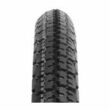
Learn more
Learn more
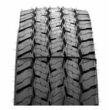
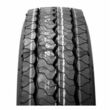
Learn more
Learn more
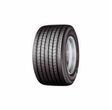
Learn more
Learn more
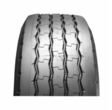
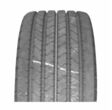
Learn more
Learn more
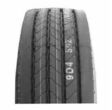
Learn more
Learn more
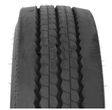
Learn more
Learn more

Learn more
Learn more
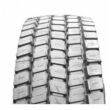
FAQ
What are the effects of weather conditions on bus tyres?
Weather conditions have a significant impact on bus tyres. Extreme temperatures, whether hot or cold, can affect tyre pressure and tread performance.
For example, extreme cold can make tyres stiffer and less grippy, while excessive heat can cause rubber expansion and an increase in internal pressure.
What are the consequences of poor wheel alignment on bus tyres?
Poor wheel alignment can lead to uneven and premature tyre wear, affecting their lifespan and vehicle safety. Signs of poor alignment include a steering wheel that pulls to one side, vibrations in the steering wheel, and irregular tread wear.
It is recommended to have the wheel alignment checked and adjusted regularly, especially after replacing tyres or carrying out major repairs on the bus.
How to choose between new and retreaded tyres for a bus?
New tyres offer the best performance and longest lifespan, but they are also more expensive. Retreaded tyres, which are used tyres that have been refurbished, are a more economical and environmentally friendly option. However, they may not offer the same durability and reliability as new tyres.
The choice will depend on the budget, operational needs, and driving conditions. For intensive use or long distances, new tyres are often preferred for their reliability.
How to properly store bus tyres when not in use?
Proper storage of bus tyres preserves their quality and extends their lifespan. Tyres should be stored in a cool, dry place away from direct sunlight. They should be placed vertically if possible to avoid deformation.
If the tyres are mounted on rims, they can be stacked horizontally, ensuring that the pressure is slightly reduced to avoid long-term deformation.
What is the importance of spare tyres for buses?
Spare tyres are essential to ensure service continuity in case of a puncture or other tyre issues on the road. Having an appropriate and well-maintained spare tyre can prevent significant delays and ensure passenger safety.






